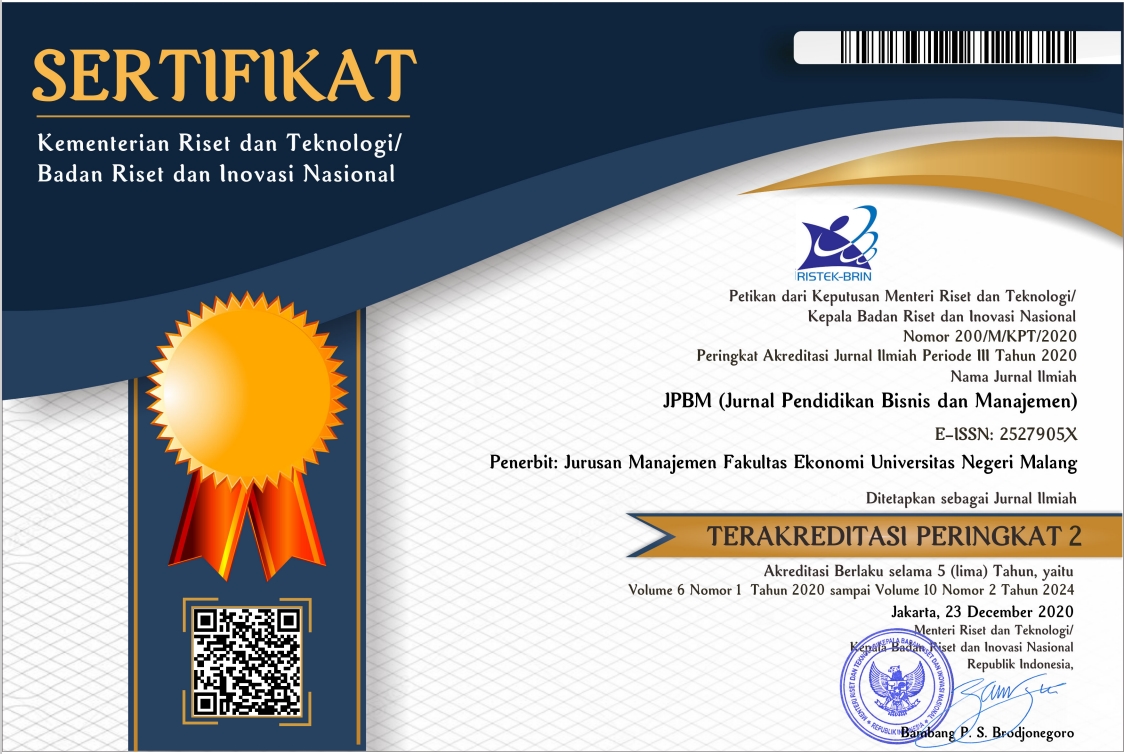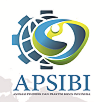Effective Online Lecturing in Islamic Business School During a New Normal Era
Abstract
Keywords
Full Text:
PDFReferences
Abe, J. A. A. (2020). Big five, linguistic styles, and successful online learning. Internet and Higher Education, 45, 100724. https://doi.org/10.1016/j.iheduc.2019.100724
Alghamdi, A., Karpinski, A. C., Lepp, A., & Barkley, J. (2020). nline and face-to-face classroom multitasking and academic performance: Moderated mediation with self-efficacy for self-regulated learning and gender. Computers in Human Behavior, 102, 214–222.
Andel, S. A., de Vreede, T., Spector, P. E., Padmanabhan, B., Singh, V. K., & Vreede, G.-J. de. (2020). No TitleDo social features help in video-centric online learning platforms? A presence perspective. Computers in Human Behavior, 106505. https://doi.org/https://doi.org/10.1016/j.chb.2020.106505
Bazeley, P. (2007). Qualitative data analysis with NVivo. London: Sage Publications Ltd. Cooper, R. D., & Schindler, S. P. (2014). Usiness Research Methods (12th Ed.). New York: Mc Graw Hill.
Cooper, R. D., & Schindler, S. P. (2014). Business Research Methods (12th ed.). Mc Graw Hill.
Creswell, J. (2012). Educational research: planning, conducting, and evaluating quantitative and qualitative. Boston: Pearson Education, Inc.
Giddens, J., Curry-Lourenco, K., Miles, E., & Reeder, E. (2020). Enhancing learning in an online doctoral course through a virtual community platform. Journal of Professional Nursing, (May), 0–1. https://doi.org/10.1016/j.profnurs.2020.05.007
Hamilton, L. A., Suda, K. J., Heidel, R. E., McDonough, S. L. K., Hunt, M. E., & Franks, A. S. (2020). The role of online learning in pharmacy education: A nationwide survey of student pharmacists. Currents in Pharmacy Teaching and Learning, (Xxxx), 0–1. https://doi.org/10.1016/j.cptl.2020.01.026
Huang, C. Q., Han, Z. M., Li, M. X., Jong, M. S. yung, & Tsai, C. C. (2019). Investigating students’ interaction patterns and dynamic learning sentiments in online discussions. Computers and Education, 140(May), 103589. https://doi.org/10.1016/j.compedu.2019.05.015%0AKassim, N., Hash
Kassim, N., Hashim, P., Hashim, D. M., & Jol, H. (2014). New Approach of samak clay usage for halal industry requirement. Procedia. Social and Behavioral Sciences, 121(September 2012), 186–192. https://doi.org/10.1016/j.sbspro.2014.01.1119
Koris, R., & Aav, S. (2019). There is more to us than meets the eye: A glimpse into how business school graduates view their purpose. International Journal of Management Education, 17(2), 151–161. https://doi.org/10.1016/j.ijme.2019.02.001
Littenberg-Tobias, J., & Reich, J. (2020). Evaluating access, quality, and equity in online learning: A case study of a MOOC-based blended professional degree program. Internet and Higher Education, 47, 100759. https://doi.org/10.1016/j.iheduc.2020.100759
Ndubuka, N. N., & Rey-Marmonier, E. (2019). Capability approach for realising the Sustainable Development Goals through Responsible Management Education: The case of UK business school academics. International Journal of Management Education, 17(3), 100319. https://doi.org/10.1016/j.ijme.2019.100319
O’Cathain, A., Murphy, E., & Nicholl, J. (2007). Why, and how, mixed methods research is undertaken in health services research in England: a mixed methods study. BMC Health Serv Res, 14(7), 85.
Shukla, S., & Raghuwanshi, B. S. (2019). Online sequential class-specific extreme learning machine for binary imbalanced learning. Neural Network, 119, 235–248.
Trkman, P. (2019). Value proposition of business schools: More than meets the eye. Nternational Journal of Management Education, 17(3), 100310.
Walsh, M. (2003). Teaching qualitative analysis using QSR NVivo. The Qualitative Report, 8(2), 251–256.
Willett, J., Brown, C., & Danzy-Bussell, L. A. (2019). An exploratory study: Faculty perceptions of online learning in undergraduate sport management programs. Journal of Hospitality, Leisure, Sport and Tourism Education, 25(May), 100206. https://doi.org/10.1016/j.jhlste.2019.100206
Refbacks
- There are currently no refbacks.
JPBM (Jurnal Pendidikan dan Bisnis Manajemen) is licensed under a Creative Commons Attribution-NonCommercial-ShareAlike 4.0 International License.
JPBM (Jurnal Pendidikan dan Bisnis Manajemen) is abstracted and indexed in :
















